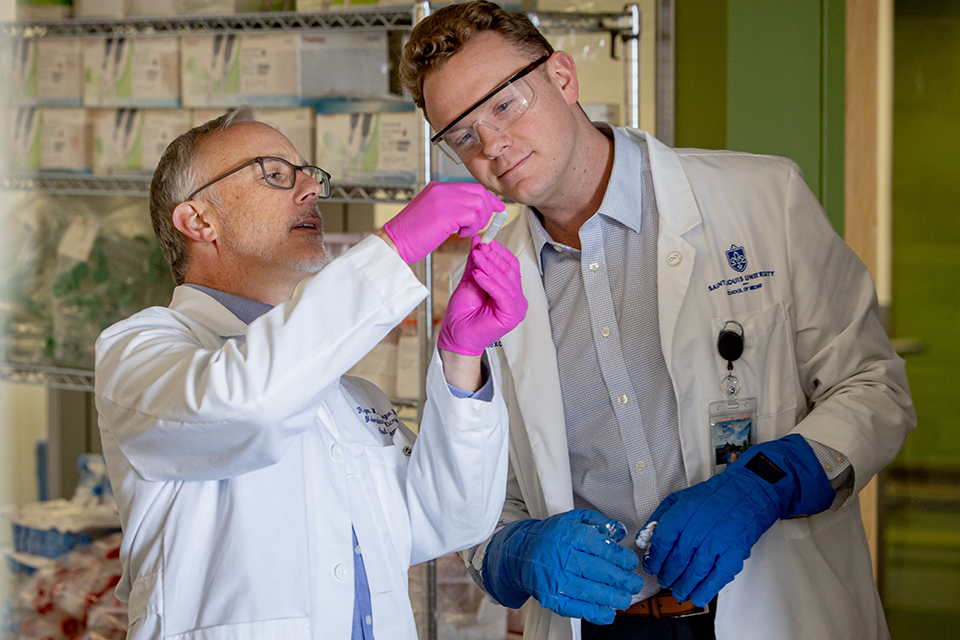SLU Study: Immune Dysfunction Increases Cancer Risk in Obese Populations
11/14/2024
ST. LOUIS —Researchers at Saint Louis University’s School of Medicine say T-cell dysfunction is leading to an increased risk of cancer in obese populations.
T cells are white blood cells called lymphocytes essential to your immune system in the fight against infections and cancer. Ryan Teague, Ph.D., professor of molecular microbiology and immunology at SLU, and his team are exploring why obesity impacts T-cell dysfunction and compromises immune surveillance, or the body’s ability to survey malignant cells and clear them before they become tumors.

Ryan Teague, Ph.D., left, and Alex Piening, an M.D./Ph.D. graduate student at SLU, work in the lab in Doisy Research Center on October 21, 2024. Photo by Sarah Conroy.
The study, which was led by Teague and co-authored by Alex Piening, an M.D./Ph.D. graduate student at SLU, was recently published in Nature Communications, found that T-cell dysfunction linked to obesity prevented T cells from detecting tumor cells, placing obese mice at higher risk of developing tumors when exposed to a carcinogen. Teague and his team are now trying to uncover the exact mechanism underlying the metabolic dysfunctions associated with obesity that directly impact T-cell function.
Ongoing projects in Teague’s lab at SLU are designed to identify barriers to successful cancer immunotherapy and develop strategies to overcome these barriers for improved patient outcomes. Teague and his team investigate how obesity impacts the efficacy of immunotherapies.
"Immunotherapy boosts a patient's immune system by targeting T cells and reinvigorating them. Paradoxically, immunotherapy is often more successful in patients with obesity, where the immune system isn’t functioning quite as well," Teague said. "Our research explains this paradox by showing that in the setting of obesity, developing tumors are only required to escape a weakened immune system. Such outgrown tumors are not well adapted to evade the reinvigorated T cells elicited during immunotherapy, and thus, are more easily destroyed."
Teague said single-cell RNA sequencing played a critical role in the study’s findings, which allowed scientists to learn what’s happening inside individual immune cells within tumors.
"We learned that the dysfunction in these T cells lies in their inability to kill tumors. Those genes were not being turned on. It also lies in their inability to acquire the metabolic functions needed to sustain anti-tumor activity," Teague said.
Thanks to SLU’s investment in single-cell RNA sequencing technology, the Department of Molecular Microbiology and Immunology has leveraged this new approach to advance its work studying cancer and the immune system, bringing us closer to new cures.
Other authors include Kelly D. Pyles, Kyle S. McCommis, Ph.D., Department of Biochemistry and Molecular Biology, Saint Louis University School of Medicine; Emily Ebert, Carter Gottlieb, Niloufar Khojandi, Lindsey M. Kuehm, Stella G. Hoft, Richard J. DiPaolo, Ph.D., Stephen T. Ferris, Ph.D., Elise Alspach, Ph.D., Department of Molecular Microbiology and Immunology, Saint Louis University School of Medicine.
Latest Newslink
- Saint Louis University Staff, Faculty Participate in Civil Rights Immersion TripSupported by the Office of Mission and Identity, Saint Louis University employees recently participated in a Civil Rights immersion trip. The group of nine, led by Patrick Cousins, pastoral formation director in Mission and Identity, took a road trip from SLU’s campus in St. Louis to sites in Tennessee, Alabama and Georgia after the spring semester ended.
- Saint Louis University Provides a Space for Religious Discernment to FlourishSaint Louis University provides an institutional framework to support men and women seeking religious vocations. Founded in 1889, SLU’s College of Philosophy and Letters oversees undergraduate and graduate programs oriented by the Jesuit commitment to intelligent service of faith and justice in dialogue with culture. The programs provide the philosophical and intellectual background needed for further studies in theology and ministry for future priests and nuns, as well as engaged laity within the Catholic Church.
- Helen De Cruz, Ph.D.: 1978-2025Helen De Cruz, Ph.D., the Danforth Chair in the Humanities at Saint Louis University, died Friday, June 20, 2025. She was 46. The Belgian-born philosopher examined why and how humans engage in pursuits that seem remote from the immediate concerns of survival and reproduction, such as theology, mathematics, and science.
- 'I am More Than Just a Refugee': A SLU Student Shares His StoryThe Saint Louis University-Jesuit Worldwide Learning (SLU-JWL) program offers remote bachelor's degrees to international students displaced by conflict, lack of opportunity, and poverty in places such as refugee camps in Kenya and Malawi. One student, Dictor Olame, reflected on his experience as a SLU student in the Kakuma refugee camp in North-Western Kenya.
- SLU Supports St. Louis by Hosting City's Tornado Relief CenterIn the weeks following a devastating tornado that tore through St. Louis on May 16, hundreds of households have turned to a centralized Disaster Assistance Center (DAC) at Chaifetz Arena for assistance.
- Persistence Pays Off for Fulbright Award RecipientAnuj Gandhi is a Fulbright Scholar. A year after being chosen as an alternate, Gandhi has been chosen for a Fulbright-Nehru Student Research Award. With the Award, the recent Saint Louis University graduate intends to "investigate how globalization-based acculturation influences Indian young adults' attitudes toward mental health and treatment options."













